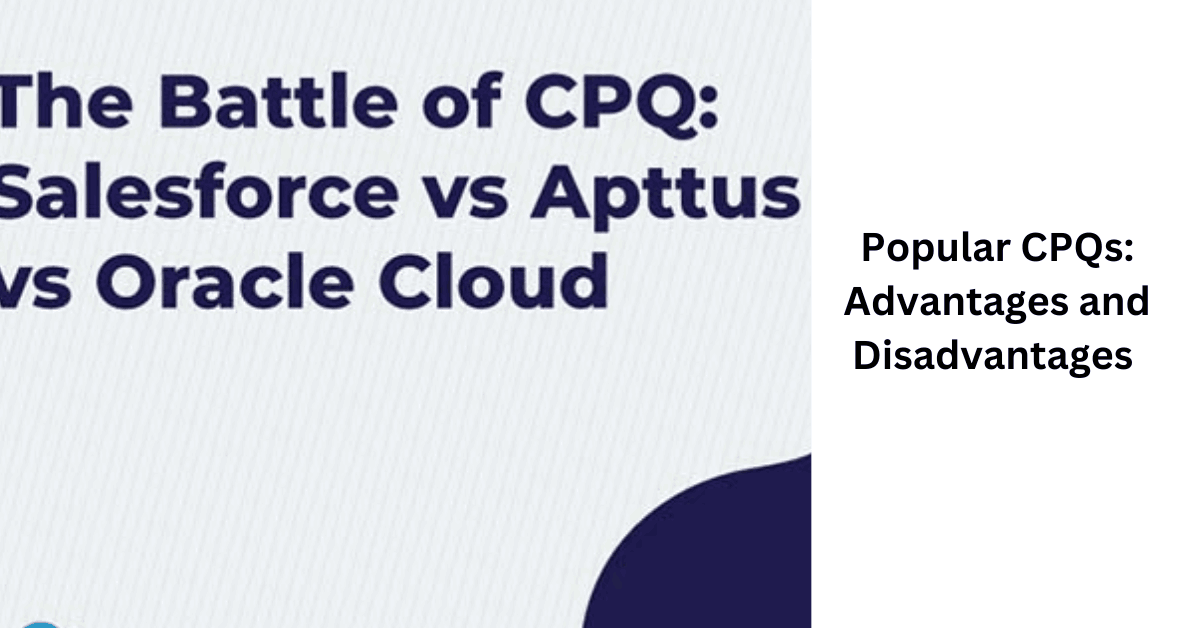Popular CPQs: Advantages and Disadvantages
Configure, price, quote (CPQ) is a modern approach to sales management designed to automate and improve the process of generating offers for customers. CPQ enables users to take into account multiple parameters and configurations of products or services, ensuring accurate and efficient pricing.
Let’s look at the main pros and cons of the most popular solutions to better understand how it can impact your business and interaction with customers.
CPQ Software: Applicable Requirements
High-quality CPQ software like Pandadoc CPQ should meet a number of criteria:
- An intuitive user interface should help users quickly master the system without complicated training. Effortless navigation through the application and access to key functions with minimal effort is important.
- Possibility to adapt the system to the unique business processes and needs of the organization. Flexible customization of access rights and product configuration settings is a must to meet diverse customer requirements.
- Compatibility and integration with systems that are already in use by the company, such as CRM, ERP, payment systems, etc. The possibility to share data and automate business processes between CPQ and other applications improves operational efficiency.
- The system should provide accurate and up-to-date information for calculating the cost of products and services. Ability to integrate with databases of products, prices, specifications, and other relevant data.
- Automated calculation of prices according to specified parameters, product configuration, promotions, discounts, and add-on terms and conditions. Different currencies, taxes, levies, and legal regulations affecting pricing should be taken into account.
- The possibility to create, edit, and store different product configurations taking into account their characteristics and variations. It should enable the user to effectively manage product configurations during the quotation process.
- The system should cover the entire sales lifecycle – from quote generation and product configuration to closing the deal and generating the necessary documentation.
- Built-in data analysis tools to monitor sales performance, analyze buying behavior, and improve business processes. Generation of reports and analytical data to make informed strategic sales decisions.
These requirements will ensure that the CPQ software functions efficiently, meeting the company’s need for accurate pricing and product configuration.
Analyzing the Most Popular CPQ Solution: Their Features
Let’s take a look at a few well-known CPQ solutions and analyze their main pros and cons. Each of these solutions is a comprehensive platform to manage configuration, pricing, and quotation designed to optimize sales processes and improve business efficiency.
Pandadoc is a platform that includes not only the Configure, Price and Quote (CPQ) system but also tools for effective document management.
- Pros: One of the main advantages offered by Pandadoc is its integration with various document management systems, which enables the automation of document creation and approval processes. Another significant advantage is the possibility of flexible customization and adaptation to specific business needs.
- Cons: However, some users note the complexity of system customization due to its extensive functionality. It is also worth considering that investments in this solution can be significant, which may not be affordable for small companies or startups.
It is recommended for document management, contracting, and facilitating approval processes. It’s ideal for businesses that need to integrate document management with product configuration and pricing processes.
Salesforce CPQ is an integrated solution in the Salesforce ecosystem designed to optimize product configuration and pricing processes.
- Pros: One of its key benefits is its deep integration with Salesforce CRM, which provides centralized management of customer and product data, increasing the efficiency of customer interactions.
- Cons: However, some organizations may face limitations with system customization, especially if they have unique business processes. License costs can also be quite high, which can be a challenge for smaller businesses.
The solution is effective in areas where myeclassnews systems and detailed sales analysis need to be co-integrated.
Oracle CPQ (Configure, Price, Quote) is an integrated sales management system designed to automate product configuration, pricing, and customer quotation processes.
- Pros: Oracle CPQ has the advantage of being a scalable and flexible platform that is capable of adapting to different business models and complex product configurations. It also provides accurate pricing calculations, as well as integration with various systems, and enables real-time management of product configurations.
- Cons: However, the cost of introducing and supporting Oracle CPQ can be significant, making this platform less affordable for smaller companies.
It is recommended for large enterprises with complex configurations focused on a high level of scalability and flexibility. It is optimal for companies where a powerful and customizable platform is required.
SAP is a CPQ tool for managing configuration, pricing, and quote generation integrated with the SAP ecosystem.
- Pros: One of the benefits of SAP CPQ is its efficient integration with other SAP products, which ensures data synchronization and improves collaboration with other business processes. The solution also provides a high degree of customization and flexible sales analytics.
- Cons: However, like many solutions by SAP, the cost of integration and maintenance can be high, which limits its use for smaller businesses.
It is ideal for businesses that require an end-to-end solution with highly customizable and analytical capabilities.

